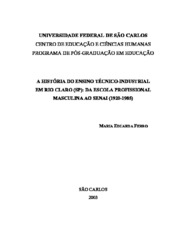A história do ensino técnico-industrial em Rio Claro (SP): da escola profissional masculina ao SENAI (1920-1985).
Abstract
This survey was fomented by the hypothesis of a relationship between the appearance of
the SERVIÇO NACIONAL DE APRENDIZAGEM INDUSTRIAL (SENAI)
(National Service of Industrial Learning) unit in Rio Claro, made official with
inauguration of SENAI Manoel José Ferreira in 1974, and the second Brazilian
industrial wave (1968-1974). In order to investigate the veracity of such a hypothesis,
bibliographic references were made about the evolutive history of Rio Claro industry
and about the responsible manual work training agencies prior to SENAI being set up in
the city, namely, the Professional School for Men of Rio Claro (1920) and the Railway
Workers Course of Paulista Railway Network (1934). We resorted to a consultation of
local legislation concerning SENAI Manoel José Ferreira , to the handling of
manuscript and printed sources belonging to this institute, and to interviews with
historical protagonists related to SENAI´s early years of work. By analyzing this whole
intraining set, it was observed that, as happened with SENAI, the origin of the two
institutions preceding this one, as regards preparation for technically qualified manual
work for industrial purposes was also related to particularities of the industrial evolution
of the city at the time of their appearances. It was also realized that being the fruit and
the answers to distinct historical contexts, the three institutions had been guided by
different pedagogic proposals that, when analyzed as a set, were a local representation
of the change in the tendency of training of industry manual work, observed in Brazil
during the 20th century. Then, the present work intended to establish a connection
between the moment of the appearance of the referred institutions and the industrial
evolution of Rio Claro, using as a guideline the growing transition from a tendency of
industrial worker training of the craftwork kind to the rationalized-technical kind.
The present undertaking was based, therefore, on the historical reconstruction that
motivated the appearance of the three institutions in the city and on the analysis of the
pedagogic proposal of these schools as far as their labor organization conceptions are
concerned. The installation of the Professional School for Men of Rio Claro (1920) took
place at a time in which the industrial-craftwork activities of the city were incipient,
thus being proper for such the pedagogic proposal that affected the craft worker
training. The rational principles of training for industrial manual work were introduced
in the city by the Railway Workers Course of Paulista Railway Network (1934), which
was implemented to meet the demand of the railway to broaden the reach of the
scientific work administration policies, postulated by the Administration Reform of
1928. The appearance of SENAI in Rio Claro (1974), in turn, was actually tied into the
features assumed by local industry after 1968, being responsible, therefore, for the
extension of rationalized-technical training of the local industrial worker, beyond the
railway field. During the period in which it was investigated (1963-1973) aspects
regarding to structure, organization and functioning of the latter were identified - which
were sorted out into periods according to the predominance of some features: Gestation
(1963-1973), Introduction and Consolidation (1973-1975); Enlargement and
Intensification (1976-1979) and Stagnation and Crises (1980-1985) and analyzed.
